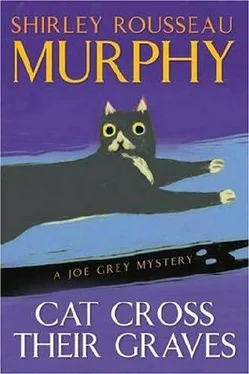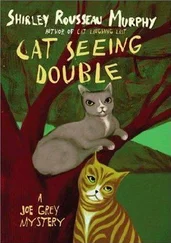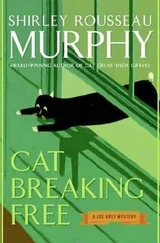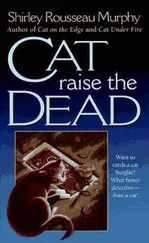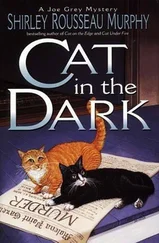Max shrugged. "You can get used to anything if it works. "
"So what does she… what do they get out of it?"
Max shrugged again. "Ego trip. Moral satisfaction, the thrill of the hunt, who knows? Maybe they're a couple of frustrated cops?"
Garza grinned, shook his head, and let the subject drop. He opened the truck door. "I'll get on the computer, get started on Fenner; hope L.A. kept good files."
As Garza swung out of the truck and headed up the street, Joe backed up the branch to a more solid perch, and sat thinking. Kit had tracked this guy, all alone. Had made his car, and had surely moved the evidence from inside that shack to where the cops could find it, in case the landlady wasn't home or didn't want to let them in. Fenner was as good as behind bars, Joe thought, thanks to the kit.
It remained to be seen if this might wrap up the other deaths as well, the little unmarked graves. Might. Might not. But plenty was falling into place, making Joe smile. Falling into place as neat as a mouse into waiting claws. Backing down the trunk to the sidewalk, into the stinking exhaust from Harper's pickup as the chief headed for the station, the tomcat took off to find Dulcie. To bring Dulcie up to speed, and then to find and praise the kit-if the little tattercoat wasn't already feeling too high to reach. Knowing Lucinda and Pedric, Kit was probably getting all the extravagant praise she could handle.

Juana Davis set the deli bag on her desk, filled her coffeepot, and switched it on. Glancing through a stack of fresh memos and reports, she signed three routine forms requesting information, returned four phone calls, which she kept as brief as possible, signed three requests to the DA. Shoving the rest of the stack aside, she carried the forms and requests up to the dispatcher. Returning to her office, she poured a mug of coffee, added creamer and sugar, and shut the door.
Placing the new stack of faxes on a tilted holder for easy reading, she opened the deli bag and unwrapped her breakfast sandwich. Eating Jolly's bacon, cheese, and egg on sourdough, she studied the more detailed background reports that had just come in on five of the missing children in the Seattle area.
Benjamin Alden was only seven. He had skipped the second grade. The two color pictures of Benjamin showed a freckled, redheaded little boy with a tooth missing in a wide grin. He was so advanced in arithmetic and English that he did not belong in third grade, either, but the school had been reluctant to let him skip another grade so soon, afraid this would create a social misfit. The kid didn't look to Juana like a misfit. Just full of high jinks, maybe. He had the same devilish twinkle as her own boys when they were small.
Benjamin's mother had transferred him to a private Catholic school in Seattle where he could advance at his own speed. She told the investigator that she had never pushed the child, that he ate up arithmetic and English grammar the way other kids did puzzles. Benjamin disappeared from the play yard of his new school around three P.M. during his third week in attendance. School had just let out. The other kids had waited for the bus or for their parents. No one saw Benjamin leave or saw him with anyone. His backpack and school books were on the steps when his mother arrived to pick him up. She searched the school and grounds for him, asked a few children. Drove home again watching the streets, checked the house and neighbors, then called the police. Police waived the requisite time of delay before the child was declared missing. Benjamin was not the first child to disappear that fall.
Officers found the fresh prints of a man's shoes in the woods that bordered the schoolyard, and signs of a struggle where the prints went deeper and were churned up. Police made casts of the prints, including the cast of a partial that turned out to match Benjamin's shoe size.
In the days preceding the disappearance, no one had seen anyone watching or following Benjamin. The child had not seemed disturbed about anything. After his disappearance, there were no phone calls or letters. No communication. Tracking dogs found a trail across the woods, which ended at the street. No one had seen a car parked there. Tire marks were photographed. Police had not turned up any suspects.
Juana finished her breakfast, which now tasted like cardboard, and swilled more coffee. Nancy Barker of Eugene was nine; she was in the fifth grade, two grades ahead of her peers. She excelled in gymnastics and world history. She was the youngest child on the elementary school's history debating team. She had disappeared from a sleep-over with five other girls at approximately two in the morning. Her friends, asleep all around her, heard nothing. No child woke. In the morning, the window was open and Nancy was gone. The girls were to go swimming that morning at a neighborhood pool. Nancy's overnight bag with a change of clothes and her bathing suit was missing. This was found later in an irrigation ditch north of Eugene. All the girls at the sleepover were neighborhood children, all from her school. Her absence was discovered about six A.M.
Police found traces of acepromazine, a tranquilizer used for animals, on her pillow, and on the carpet flecks of grass that matched the lawn. There were no fingerprints other than those of the girls and the sleep-over family. No one saw a car, no neighbors heard or saw anything. No one heard a dog bark. The family dog, who slept in the fenced yard, and three dogs on the same street had been tranquilized. There were no follow-up sightings of the child. There was no request for ransom.
Juana rose to refill her coffee mug. Unusually bright children and no request for ransom. A dangerous nutcase; dangerous, irreparably twisted. If these were the children found in the senior ladies' garden, they had to consider that the killer had lived in or near Molena Point. She sat looking at the reports, wondering. Could he have lived in the house that now belonged to the seniors? She had already been through the old tax records, she had the names of the two previous owners. That took her back twenty years. There was no record of the tenants; most of those rentals were illegal. All such small illegal apartments, termed granny flats, were presumably kept for family members. She planned to talk with the neighbors this morning. Rising, she was headed out, had stopped at the dispatcher's counter when Garza and Harper came in, the chief carrying a couple of full-size brown envelopes and both of them wearing smug grins.
"Come on," Harper told her, and moved down the hall to Garza's office. Davis followed. Garza sat down at his desk and booted up the computer. Davis and Harper stood in the doorway. Both the chief and Dallas were still grinning. Harper said, "Those old L.A. cases, when Patty's grandchild was murdered?"
Juana nodded.
Harper opened the two brown envelopes, shook the contents out on the desk. She looked down at the newspaper clippings, read them, picked up the photographs. Patty, young and smiling. Looked again at the small man in the clippings, then was grinning like the two of them. Like the cat that ate the canary.
"Sick," she said. "Those poor, bright children. All five, way ahead in school." She picked up one of the old newspaper photographs of Irving Fenner.
Harper said, "We have Fenner's car. He's staying in a rental cottage. Envelopes were under the foundation."
Juana looked at him. "The snitch?"
Harper nodded. "Landlady says Fenner was there last night, at least she heard him come in. Place reeks of booze. And there's more," he said, frowning. "You had breakfast?"
She nodded.
Harper picked up a single doughnut from beside Garza's empty coffeepot, stared at it, entombed in its plastic wrap, and tapped it on the desk. It sounded like a rock. Picking up Garza's phone, he asked Mabel to call Jolly's, see if they could send over some breakfast. He looked at Juana. "Anything from Hyden this morning?"
Читать дальше
